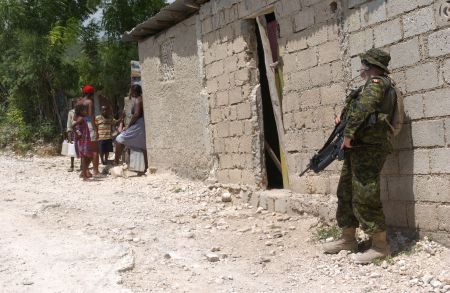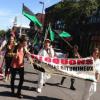In February 2004, Canada participated in a coup d'état which removed Haiti's democratically elected government, and unleashed a multi-year reign of terror by the unelected "interim" government, which enjoyed Canada's financial, diplomatic and military support. In the years following the coup, thousands were killed for their opposition to the unelected post-coup government, while thousands more were jailed or forced into hiding.
Denis Coderre, who nearly ten years later is the front runner in Montreal's mayoral election, played a key role during the decisive moments of the coup. [Update, Nov 5: Coderre has been elected Mayor of Montreal.]
Coderre, who was Minister responsible for La Francophonie in 2003 and 2004, was also Prime Minister Paul Martin's "special advisor on Haiti" during the post-coup period.
In the leadup to the coup, Coderre's false and misleading statements were decisive in confusing and misdirecting nascent opposition to Canada's participation in overthrowing a democratically elected government. In official circles, much of the deception holds to this day.
"It is clear that we don't want Aristide's head; we believe that Aristide should stay," Coderre told the Canadian Press on February 20, 2004, nine days before Canadian troops landed in Haiti, facilitating the removal of Aristide (who had been elected president with 80% of the vote) and the elected government, paving the way for the installation of hand-picked replacements.
The statement rang false at the time, because Coderre's predecessor at La Francophonie had anonymously floated a plan to replace Haiti's government to Quebec journalist Michel Vastel a year earlier. Because Coderre was not directly connected to the story, he could plausibly deny that his government was planning a coup d'état to those unwilling to dig deeper. The truth was firmly established in 2006, when diplomatic memos from Canada's embassy in Haiti revealed that nine days before Coderre claimed Canada wanted Aristide to stay, his government was in fact already planning a military invasion of Haiti and the coup d'état.
In his February 11th memo, Kenneth Cook blamed Aristide for the crisis. This crisis had in fact been largely manfactured by the US, as the New York Times and many others would later report, but it was a convenient pretext to get rid of a government that refused to follow its neoliberal marching orders. In another memo, Cook appears to be considering other possibilities for toppling Aristide, including a military coup.
Coderre repeated the falsehood that Canada was working for a peaceful resolution to the pre-coup conflict in Haiti numerous times, both in Parliament and in interviews. Coderre was Canada's delegate to a "peace mission" which, on February 22, claimed to be attempting to find a peaceful solution to the crisis.
On February 29th, Canadian troops took control of the Port-au-Prince airport as US Marines kidnapped Haiti's elected President and flew him to the Central African Republic. Canadians troops then occupied the country. They would eventually be replaced by the UN "stabilization force," MINUSTAH, which still occupies Haiti today.
As the new, American-selected Haitian government was installed, Coderre didn't miss a beat. In Parliament, he claimed that Aristide had left of his own accord, and then rebuffed calls for an inquiry into Aristide's departure by looking to the future:
Instead of continually thinking about holding inquiries because we think that the president left, should we not instead think about how to rebuild Haiti, ensure that the rebels and insurgents on all sides are disarmed and that, first and foremost, the people of Haiti are respected and protected?
Canada had already begun to remake Haiti, overseeing, among other things, its justice ministry and its police force, among others. Canadian aid bureaucrat Philippe Vixamar was appointed Deputy Justice Minister (the actual Minister, Bernard Gousse was a USAID bureaucrat), and remained an employee of the Canadian government. The Royal Canadian Mounted Police oversaw the training and vetting of the new Haitian National Police. Were the people of Haiti "respected and protected"?
The facts were hotly contested at the time, but now there is little doubt. Several in-depth reports -- by Amnesty International, teams from the University of Miami and Harvard Law School, and other human rights groups -- point to the RCMP-trained and -approved Haitian National Police killing thousands of political dissidents, through attacks on poor neighbourhoods and brutal mass killings. These forces were often accompanied by UN "peacekeeping" forces and Canadian Forces, which often participated in the killing or provided military backup.
At the same time, Haiti's jails -- under the watchful eye of the CIDA-employed Deputy Justice Minister -- were filled with thousands of political prisoners, usually kept in unlivable conditions.
These developments did not appear to make an impression on Mr. Coderre, who in May 2005 made a point of applauding the RCMP's role. "In my role as special advisor for Haiti," Coderre told Parliament, "I was able to see that the RCMP did a tremendous job at the international level."
In sowing confusion around Canada's involvement in the coup, and building support for its horrific interventions in the years following, Coderre drew on his experience in public relations. Before he became an Member of Parliament, Coderre was a Vice President at Le Groupe Polygone, a public relations firm which was under investigation for its $44 million in government contracts during the Liberal sponsorship scandal. In 2000, the firm received payment of $330,000 for promoting the Canadian government at a hunting and fishing show which never took place.
In a way, his firm's payment for things that never happened could be seen as an eerie foreshadowing of Coderre's contribution to making the Haiti coup disappear from public discourse. Peter Hallward, who wrote a history of the 2004 coup in Haiti, wrote "Not only did the coup of 2004 topple one of the most popular governments in Latin America but it managed to topple it in a manner that wasn’t widely criticised or even recognised as a coup at all." Without a doubt, Coderre played a decisive role at a crucial moment to help that "success" along.
While it may have disappeared from Canada's consciousness, the consequences of the coup remain very real for Haitians. Lavalas -- arguably still the country's most popular political party -- has been barred from participating in every election since 2004. Meanwhile, the aftermath of the devastating 2010 earthquake has added new depths to the country's suffering.
"We keep working, we keep pushing forward," Coderre said of his campaign recently. While Coderre solicits votes as Mayor of Montreal, his legacy is still pushing forward in Haiti as well.








